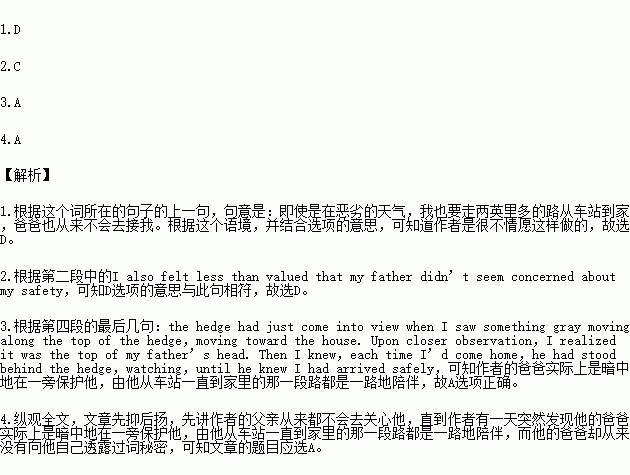题目内容
Raised in a fatherless home,my father was extremely tightfisted towards us children. His attitude didn’t soften as I grew into adulthood and went to college. I had to ride the bus whenever I came home. Though the bus stopped about two miles from home,Dad never met me,even in severe weather. If I grumbled,he’d say in his loudest father-voice,“That’s what your legs are for!”
The walk didn’t bother me as much as the fear of walking alone along the highway and country roads. I also felt less than valued that my father didn’t seem concerned about my safety. But that feeling was canceled one spring evening.
It had been a particularly difficult week at college after long hours in labs. I longed for home. When the bus reached the stop,I stepped off and dragged my suitcase to begin the long journey home.
A row of hedge(树篱)edged the driveway that climbed the hill to our house. Once I had turned off the highway to start the last lap of my journey,I always had a sense of relief to see the hedge because it meant that I was almost home. On that particular evening,the hedge had just come into view when I saw something gray moving along the top of the hedge,moving toward the house. Upon closer observation,I realized it was the top of my father’s head. Then I knew,each time I’d come home,he had stood behind the hedge,watching,until he knew I had arrived safely. I swallowed hard against the tears. He did care,after all.
On later visits,that spot of gray became my watchtower. I could hardly wait until I was close enough to watch for its secret movement above the greenery. Upon reaching home,I would find my father sitting innocently in his chair. “So! My son,it’s you!” he’d say,his face lengthening into pretended surprise.
I replied,“Yes,Dad,it’s me. I’m home.”
1.What does the underlined word “grumbled” in Paragraph 1 probabl y mean .
y mean .
A. Accepted happily.
B. Explained clearly.
C. Agreed willingly.
D. Spoke unhappily.
2.What made the author feel upset was ______.
A. the tiredness after long hours in labs
B. the fear of seeing something moving
C. the feeling of being less than valued
D. the loneliness of riding the bus home
3.The author’s father watched behind the hedge because ______.
A. he was concerned about his son’s safety
B. he wanted to help his son build up courage
C. he didn’t want to meet his son at the doorway
D. he didn’t think his son was old enough to walk alone
4.Which of the following can be the best title for the text
A. My Father’s Secret.
B. The Life of My father.
C. Terrible Journey Home.
D. Riding Bus Alone.

